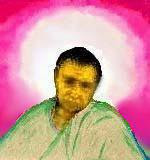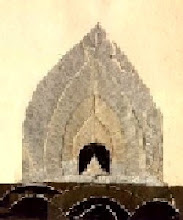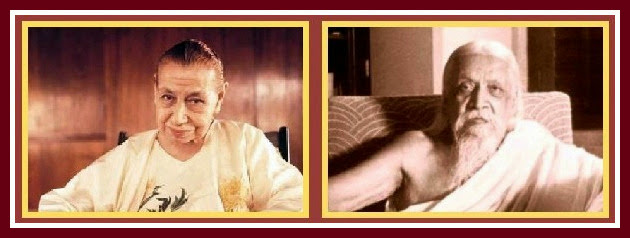Thoughts
and Aphorisms 37
37. Some say Krishna never lived, he is a myth. They mean on earth;
for if Brindavun existed nowhere, the Bhagwat could not have been written.
[Sri Aurobindo:
Thoughts and Aphorisms]
Some say that Sri
Krishna never lived. Sri Aurobindo says that they stated about Sri Krishna’s
existence on earth. However, He also said that if Brindavun existed nowhere,
then Srimad Bhagavat could not have been written. Certainly, He is referring to
existence beyond the earth, beyond the physical level, in the inner worlds. Therefore,
the existence of Brindavun and of Sri Krishna in some inner world is a must,
besides their possible existence on earth.
The Mother has
explained this by saying that the whole earth and whatever exists on earth is a
concentrated manifestation, a representation of something that exists in some
other inner worlds, invisible to the ordinary human or material eye. There are
a few persons — the Seers — who are developed in their vision and can see
beyond the worlds of Matter, who have developed the inner vision of things
beyond the physical eye of the ordinary human beings. These seers are capable
of seeing and knowing beyond the capacities of the ordinary human mind and
senses and can see the realities in the Higher and the Inner worlds. And in the
Worlds of gods — in the plane of the Overmind — there exists and ideal and
harmonious Brindavun, of which the earthly Brindavun is but a deformation.
She further says that
the writer or the writers of Bhagavat
had been in contact with the whole inner world, a world that is truly real and
existent, where the original Brindavun exists.
According to The
Mother, the question whether Sri Krishna physically existed in a human form on
earth is a matter of lesser importance than the fact that Sri Krishna is a real
and active Being who exists for ever and who has a great contribution for the
growth and transformation of this earth.
***
However, Sri Aurobindo has said in The Essays on The Gita’ that Sri
Krishna was an Avatar, ‘a
dual phenomenon of divinity and humanity’ born on earth to
act as the instrument of the divine consciousness and power and the divine
works.
Sri Aurobindo has said:
‘The Avatar is always a dual phenomenon
of divinity and humanity; the Divine takes upon himself the human nature with
all its outward limitations and makes them the circumstances, means,
instruments of the divine consciousness and the divine power, a vessel of the
divine birth and the divine works. But so surely it must be, since otherwise the
object of the Avatar’s descent is not fulfilled; for that object is precisely
to show that the human birth with all its limitations can be made such a means
and instrument of the divine birth and divine works, precisely to show that the
human type of consciousness can be compatible with the divine essence of consciousness
made manifest, can be converted into its vessel, drawn into nearer conformity
with it by a change of its mould and a heightening of its powers of light and
love and strength and purity; and to show also how it can
be done. If the Avatar were to act in an entirely supernormal
fashion, this object would not be fulfilled.’ [Essays on The Gita, Ch.XVI]
Sri Aurobindo further says:
‘He [Sri Krishna] speaks as yet not at all in set terms of the Purushottama, but of himself,—“I”, Krishna, Narayana, the Avatar, the God in man who is also the Lord in the universe incarnated in the figure of the divine charioteer of Kurukshetra.’ [Essays on The Gita, Ch.XIV]
Sri Aurobindo has even said that
Sri Krishna is one of the Ten Avatrs, who have led the Evolution on earth:
‘The Hindu procession of the ten
Avatars is itself, as it were, a parable of evolution. First the Fish Avatar,
then the amphibious animal between land and water, then the land animal, then
the Man-Lion Avatar, bridging man and animal, then man as dwarf, small and
undeveloped and physical but containing in himself the godhead and taking
possession of existence, then the rajasic, sattwic, nirguna
Avatars, leading the human development from the vital rajasic to the sattwic
mental man and again the overmental superman. Krishna, Buddha and Kalki depict the last three stages, the stages of the
spiritual development – Krishna opens the possibility of overmind, Buddha tries
to shoot beyond to the supreme liberation but that liberation is still
negative, not returning upon earth to complete positively the evolution; Kalki is to correct this by bringing the Kingdom of the
Divine upon earth, destroying the opposing Asura forces. The progression is
striking and unmistakable.’ [Letters on Yoga, p402]
Sri Aurobindo further defines an Avatar:
‘An Avatar, roughly speaking, is
one who is conscious of the presence and power of the Divine born in him or
descended into him and governing from within his will and life and action; he
feels identified inwardly with this divine power and presence.’ [Letters
on Yoga, p416]
Sri Aurobindo says
that an Avatar is the Supreme Divine born as a human being in the earthly
conditions in order to bring some positive change and evolutionary progress for
Man towards the Divine, and therefore it is ascertained that Sri Krishna was
born on earth as an Avatar:
‘But it is to assist
that ascent or evolution the descent is made or accepted; that the Gita makes
very clear. It is, we might say, to exemplify the possibility of the Divine
manifest in the human being, so that man may see what that is and take courage
to grow into it. It is also to leave the influence of that manifestation
vibrating in the earth-nature and the soul of that manifestation presiding over
its upward endeavour. It is to give a spiritual mould of divine manhood into
which the seeking soul of the human being can cast itself. It is to give a
dharma, a religion, – not a mere creed, but a method of inner and outer living,
– a way, a rule and law of self-moulding by which he can grow towards divinity.
It is too, since this growth, this ascent is no mere isolated and individual
phenomenon, but like all in the divine world-activities a collective business,
a work and the work for the race, to assist the human march, to hold it
together in its great crises, to break the forces of the downward gravitation
when they grow too insistent, to uphold or restore the great dharma of the
Godward law in man's nature, to prepare even, however far off, the kingdom of
God, the victory of the seekers of light and perfection, sādhūunām, and the overthrow of those who fight for the
continuance of the evil and the darkness. All these are recognised objects of
the descent of the Avatar, and it is usually by his work that the mass of men
seek to distinguish him and for that that they are ready to worship him. It is
only the spiritual who see that this external Avatarhood is a sign, in the
symbol of a human life, of the eternal inner Godhead making himself manifest in
the field of their own human mentality and corporeality so that they can grow
into unity with that and be possessed by it. The divine manifestation of a
Christ, Krishna, Buddha in external humanity
has for its inner truth the same manifestation of the eternal Avatar within in
our own inner humanity. That which has been done in the outer human life of
earth, may berepeated in the inner life of all human beings’. [Essays on The
Gita Page 150 ]
***
Now we can see that archaeological
discoveries in India has
further established the Fact Sri Krishna was born in India, as described in Mahabharat.
The city of Dwaraka, the site of the legendary city of Lord Krishna, was
discovered between 1983 to 1990. It was extending more than half a mile from
the shore. The township was built in six sectors along the banks of a river.
The foundation of boulders on which the city's walls were erected proves that
the land was reclaimed from the sea. The general layout of the city of Dwaraka described in
ancient texts agrees with that of the discovered city now submerged. Dwaraka
was submerged by the sea right after the death of Lord Krishna. According to the discoveries, Dwaraka was a
prosperous city in ancient times, which was destroyed and reconstructed several
times. These archaeological explorations support and validate the dates arrived
at through astronomical calculations. They also prove that Dwaraka, a
prosperous port city, was in existence in the 15th century B.C. before being
submerged under the sea in the year 1443 B.C. The discovery of the legendary
city of Dwaraka, said to have been founded by
Sri Krishna, is an important landmark in the history of India. It has silenced
the questions raised by some historians about the historicity of Mahabharata
and the very existence of Dwaraka city. It has also greatly filled up the gap
in the Indian history by establishing the continuity of Indian civilization
from the Vedic age to the present day.
Excavations at Dwaraka, done by
Dr. S. R. Rao, a great archaeologist of India. prove that the descriptions
as found in the ancient texts of Mahabharata etc. are not imaginary or fanciful
but are based on actualities as seen by their authors.
Barindranath Chaki
Written
and posted on 23-9-2012.










